Alison DeLuca's Blog, page 18
December 10, 2012
Desperate Catch Up Day
WARNING - Whine to follow from Mom-Without-A-Life
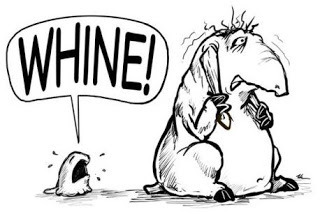
I spent the past few days volunteering, cooking lunch, running about with family, etc - so I missed a few days of my Christmas Book meme. I'm catching up today and tomorrow, so I'll post what I missed in the meantime....
Day 7 - Most Underrated Book -
Plainsong by Kent Haruf wins this category. A book about a pregnant teen, two old farmers, a teacher with two sons and a wife in a deep depression, as well as a dreadful bully whose parents sue the school district, Plainsong is lovely, spare, and as breathtaking as the rural Colorado landscape that is the setting.
There are no fancy turns of phrase, but when one of the McPherons - the two old farmers who take in Victoria, the pregnant teenager - gets angry, Haruf's language reflects his speechless, blistering rage in a way that is genius.
The book really should be taught in college lit courses (maybe it is?) instead of The Scarlet Letter. Nothing wrong with Hawthorne, except the archaic language and reactions to the situation can turn off emerging readers. (Please, while we are at it, could we also get rid of Billy Budd?)
The ending is lovely, evocative of a silent sunset over bare, frozen fields. But it is more than that - Plainsong includes an exciting plot, told from several points of view, as well as what I call "That Elusive Compelling Factor." When I began the book, I had to keep reading until I finished - it was that good.
As for the Indie book in this category - alas, there are many, many Indies that get lost in the shuffle of Fifty Shades and celebrity tell-alls. I had a very difficult time selecting just one. In the end I picked The Amber Room by Tom Harris.
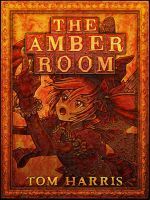
Perhaps browsers are looking for action-adventures about a mythical treasure in Russia and thus skip over Harris - a mistake, since this book delivers a gently told urban fantasy about a boy who is trying to save his sister in hospital.
He goes on several adventures with a fairy called Rosie Boots. She is a great creation - brave and acerbic, humorous and not at all sentimental. I'm not a fairy fan in my urban fantasy, but I really loved her.
I also loved the main character, North, who is a kleptomaniac. Granted, I'm a sucker for character flaws, and his flaw leads him in (and out) of adventures in the book. I highly recommend it as a great read over your latte in the cyber cafe as a great break from holiday shopping.


I spent the past few days volunteering, cooking lunch, running about with family, etc - so I missed a few days of my Christmas Book meme. I'm catching up today and tomorrow, so I'll post what I missed in the meantime....
Day 7 - Most Underrated Book -
Plainsong by Kent Haruf wins this category. A book about a pregnant teen, two old farmers, a teacher with two sons and a wife in a deep depression, as well as a dreadful bully whose parents sue the school district, Plainsong is lovely, spare, and as breathtaking as the rural Colorado landscape that is the setting.
There are no fancy turns of phrase, but when one of the McPherons - the two old farmers who take in Victoria, the pregnant teenager - gets angry, Haruf's language reflects his speechless, blistering rage in a way that is genius.
The book really should be taught in college lit courses (maybe it is?) instead of The Scarlet Letter. Nothing wrong with Hawthorne, except the archaic language and reactions to the situation can turn off emerging readers. (Please, while we are at it, could we also get rid of Billy Budd?)
The ending is lovely, evocative of a silent sunset over bare, frozen fields. But it is more than that - Plainsong includes an exciting plot, told from several points of view, as well as what I call "That Elusive Compelling Factor." When I began the book, I had to keep reading until I finished - it was that good.
As for the Indie book in this category - alas, there are many, many Indies that get lost in the shuffle of Fifty Shades and celebrity tell-alls. I had a very difficult time selecting just one. In the end I picked The Amber Room by Tom Harris.

Perhaps browsers are looking for action-adventures about a mythical treasure in Russia and thus skip over Harris - a mistake, since this book delivers a gently told urban fantasy about a boy who is trying to save his sister in hospital.
He goes on several adventures with a fairy called Rosie Boots. She is a great creation - brave and acerbic, humorous and not at all sentimental. I'm not a fairy fan in my urban fantasy, but I really loved her.
I also loved the main character, North, who is a kleptomaniac. Granted, I'm a sucker for character flaws, and his flaw leads him in (and out) of adventures in the book. I highly recommend it as a great read over your latte in the cyber cafe as a great break from holiday shopping.
Published on December 10, 2012 06:45
December 6, 2012
A Book that Makes Me Sad
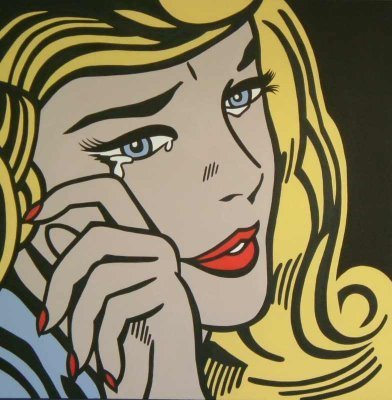 Some books, alas, make readers teary. Anne of Green Gables had a great riff on this; the red-headed orphan's saddest story was called "My Graves."
Some books, alas, make readers teary. Anne of Green Gables had a great riff on this; the red-headed orphan's saddest story was called "My Graves."But in the real world some fiction is so gritty and realistic, or so poignant that it brings me to the point of Mush when I read it. After the last page of A Thousand Splendid Suns, for example, I had to go and hug my four-year old daughter. HAD TO. By the way, it was two in the morning, since the book was so good I couldn't stop reading. Couldn't stop sniffling, either. Mush Factor - 3 out of 5.
Another was The Road. This dystopian chiller is beautifully written. It was a compelling read - I had to find out what happened. The last few paragraphs are the most lyrical, and they are also the saddest. I have never seen the movie, and I don't know if I want to - the book was bad enough. Mush Factor - 4 out of 5.
But the saddest book I've read yet was The God of Small Things, which earns a perfect 5 out of 5 Mush Factor points. What happens is so bad, for so many people, and yet again - the language and descriptions are really lovely and lyrical, and I could not put it down.
So I suppose the last is my true choice for a book that makes me sad. I call the three books above "The greatest books I'll never read again."
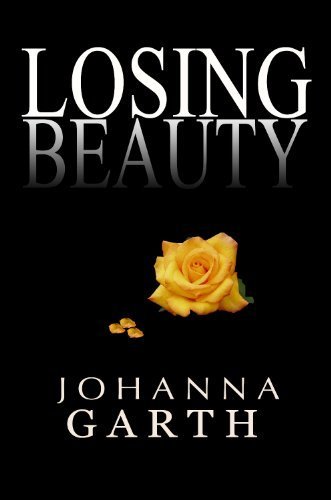
As for my Indie choice, I'd have to pick Losing Beauty. What happens is certainly sad, although again it has that compelling factor that drove me to my Kindle in the wee hours to read "only a few more pages." And the writing is lovely - and there is a bit more hope in this one than in the others.
If you enjoy a good, sniffly read, I'd certainly recommend any of the above. But if you want at thehint of possible happiness, I'd offer the last.
Published on December 06, 2012 09:11
December 5, 2012
A Book that Makes Me Happy - 30 Days of Books, Day 5
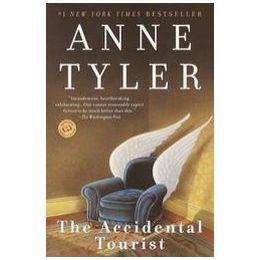 Hand me any book by Anne Tyler, and I'm happy. I loved Ladder of Years and was entranced by the thought of a wife and mother who just decides to leave it all behind and move to another city - even though she is only wearing a bikini, a beach coverup, and has a few hundred dollars in her purse.
Hand me any book by Anne Tyler, and I'm happy. I loved Ladder of Years and was entranced by the thought of a wife and mother who just decides to leave it all behind and move to another city - even though she is only wearing a bikini, a beach coverup, and has a few hundred dollars in her purse. As for The Accidental Tourist, I've read it so many times I'm on my fifth copy. Tyler's descriptions are always spot on, to the point that while I'm reading I have to stop, read again, and say, "Yup, that's totally what I thought too except I never knew it before."
PS - If you were turned off by the movie, press on. The book, as is usually the case is much better. I did enjoy Bill Pullman, though, I must say.
“You ever wonder what a Martian might think if he happened to land near an emergency room? He’d see an ambulance whizzing in and everybody running out to meet it, tearing the doors open, grabbing up the stretcher, scurrying along with it. ‘Why,’ he’d say, ‘what a helpful planet, what kind and helpful creatures.’ He’d never guess we’re not always that way; that we had to, oh, put aside our natural selves to do it. ‘What a helpful race of beings,’ a Martian would say. Don’t you think so?” - The Accidental Tourist
“But his study was so dim and close, and it gave off the salty inky smell of mental fidgeting.” - The Accidental Tourist [image error]
As for my Indie book, I'd have to choose The Last Good Knight, by Connie J Jasperson. Yes, it's a saucy, bawdy read, but the characters are as alive as the Wife of Bath in the Canterbury Tales.
The scene where a bullying, violent Lord is unmanned by a female knight is fantastic - and very bawdy. The romance is tender, frustrating, and REAL. Sir Julian is swoon-worthy, as is Lady Mags herself, the female knight. Reading their stories and long relationship always puts me in a good mood.
" 'I think your horse is sulking, Lackland,' ventured Slippery Jack after they had been on the road a while.'Do you? I suppose he is. He has delusions of grandeur, you know,' Julian replied. 'His dying ambition is to be put to stud for the rest of his days, the randy old beast.' " - The Last Good Knight
Published on December 05, 2012 06:22
December 4, 2012
Favorite Book of Favorite Series - Day 4
Yesterday I picked out my favorite series, trad pub and Indie. They were, respectively, Harry Potter and the Darkness Rising books.

Today I'm choosing my favorite books in the series. Easy!
For Harry, the Order of the Phoenix was, without a doubt, my favorite. It was the longest book, and for a reason - Harry entered adolescence and became a bit of a pill, in a completely natural way. After all, he had a rough start, so it would have been unbelievable if he was all sweetness and light. No cut-out Victorian heroes for JK!
I loved the secret Defense Against the Dark Arts classes, the ongoing arguments between Hermione and Ron who were already acting like an old married couple, and the Order of the Phoenix itself. But the crowning achievement was Umbridge. She was so nasty and horrible she was nearly unbelievable - except I've worked with her, in my former life as a teacher. Yes, I was an a faculty with Umbridge, and very annoying it was, too.
As for the Darkness Rising series, Book Two: Quest was my favorite. Kitson really seemed to hit his stride with his characters and writing. There was one scene that blew me away, as death and horror fills a town, the villagers sing a long song about a Silver Lady. It is reminiscent of Tolkien at his best.
(By the way, Kitson just received a glowing review for the series at the British Fantasy Society, here.)
Now, what is your favorite series? And the favorite book in it?

Today I'm choosing my favorite books in the series. Easy!
For Harry, the Order of the Phoenix was, without a doubt, my favorite. It was the longest book, and for a reason - Harry entered adolescence and became a bit of a pill, in a completely natural way. After all, he had a rough start, so it would have been unbelievable if he was all sweetness and light. No cut-out Victorian heroes for JK!
I loved the secret Defense Against the Dark Arts classes, the ongoing arguments between Hermione and Ron who were already acting like an old married couple, and the Order of the Phoenix itself. But the crowning achievement was Umbridge. She was so nasty and horrible she was nearly unbelievable - except I've worked with her, in my former life as a teacher. Yes, I was an a faculty with Umbridge, and very annoying it was, too.
As for the Darkness Rising series, Book Two: Quest was my favorite. Kitson really seemed to hit his stride with his characters and writing. There was one scene that blew me away, as death and horror fills a town, the villagers sing a long song about a Silver Lady. It is reminiscent of Tolkien at his best.
(By the way, Kitson just received a glowing review for the series at the British Fantasy Society, here.)
Now, what is your favorite series? And the favorite book in it?
Published on December 04, 2012 04:59
December 3, 2012
Christmas O'Clock and Water
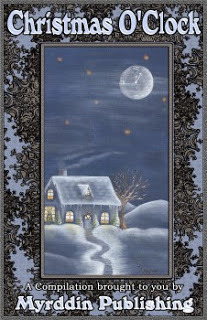 We've released an anthology of Christmas stories for kids called Christmas O'Clock. It includes two full-length books and three stories, including Rudolph Saves Christmas and Bah, Humbug!
We've released an anthology of Christmas stories for kids called Christmas O'Clock. It includes two full-length books and three stories, including Rudolph Saves Christmas and Bah, Humbug!All royalties go to the Water is Life charity, which works to provide clean drinking water for kids and families in the third world. Since the anthology is an international effort, we wanted the charity to be worldwide as well. And this charity is amazing - it dispenses a simple, small filtration system known as "The Straw."
The Straw removes tiny microbes that can cause typhoid, cholera, and dysentery. It also removes nasty things called "guinea worms" so children can drink and stay healthy. Each one costs ten dollars and lasts for a year.
Of course, that is only a first step. Water is Life also works to put in complete water systems so villages can access clean water without using The Straw.
We are offering Christmas O'Clock for FREE today and tomorrow - 12/3 and 12/4 - on Kindle in order to get the word out about our book and this very important charity. If you haven't downloaded Christmas O'Clock yet, do have a look on Amazon US, UK, Germany, Spain, France, Japan, and Italy.
Enjoy!
Published on December 03, 2012 09:38
30 Days of Books - My Favorite Series
The Frabjous wonder of a good series - of reading a book, knowing that more will follow with the same characters and fantastic writing.

Of course Harry Potter comes to mind instantly, as well as Moomins, Tolkien - starting with The Hobbit of course - and the Dido Twite books. In each series, an adventure happens and ends rather satisfactorily at the end. JK Rowling and Tolkien went one step further and introduced a common thread, a continuing siege or adventure that kept readers returning for more.
Kill Voldemort!
Destroy the Ring!
Still, each volume of the series is, of itself, a good read with a beginning, middle, and an end.
Trust me, as an author of a series, this is a very hard thing to accomplish. You want the readers to be able to pick up any book and begin to read, but usually you really have to start at the beginning.
Of the above, for sheer genius in creating compelling story arcs and likable, living characters, I must go with JK. When I started The Deathly Hallows, I thought there was no WAY she could resolve every issue, especially with all those Horcruxes to be destroyed. Yet, resolve them she did. The woman is a goddess.
On the Indie front, my favorite series is Darkness Rising by Ross Kitson. Emelia is the main character, and she begins as a lowly servant in a castle. Soon she is propelled into a series of adventures, and she discovers hidden resources of strength and bravery.
It's all very epic and fantastic. Kitson makes Emelia spring to life right from the start. He has done a lot of world building; like JK Rowling, his universe (Nurolia) has been imagined with maps, languages, and characters. Kitson, a doctor in the UK, painstakingly illustrates them all, so the book is a journey through an imaginary country.
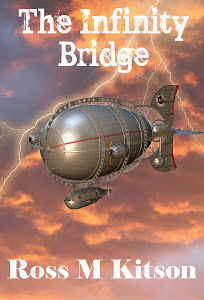
And - joy! Kitson has just started another series, called Infinity Bridge. This one is a steampunk read, with loads of urban fantasy. I devoured the first book and can't wait for the next.
And then there are those books that SHOULD be a series but are not .... cough ... Jonathan Strange and Mr. Norrell ... we are still waiting...

Of course Harry Potter comes to mind instantly, as well as Moomins, Tolkien - starting with The Hobbit of course - and the Dido Twite books. In each series, an adventure happens and ends rather satisfactorily at the end. JK Rowling and Tolkien went one step further and introduced a common thread, a continuing siege or adventure that kept readers returning for more.
Kill Voldemort!
Destroy the Ring!
Still, each volume of the series is, of itself, a good read with a beginning, middle, and an end.
Trust me, as an author of a series, this is a very hard thing to accomplish. You want the readers to be able to pick up any book and begin to read, but usually you really have to start at the beginning.
Of the above, for sheer genius in creating compelling story arcs and likable, living characters, I must go with JK. When I started The Deathly Hallows, I thought there was no WAY she could resolve every issue, especially with all those Horcruxes to be destroyed. Yet, resolve them she did. The woman is a goddess.
On the Indie front, my favorite series is Darkness Rising by Ross Kitson. Emelia is the main character, and she begins as a lowly servant in a castle. Soon she is propelled into a series of adventures, and she discovers hidden resources of strength and bravery.
It's all very epic and fantastic. Kitson makes Emelia spring to life right from the start. He has done a lot of world building; like JK Rowling, his universe (Nurolia) has been imagined with maps, languages, and characters. Kitson, a doctor in the UK, painstakingly illustrates them all, so the book is a journey through an imaginary country.

And - joy! Kitson has just started another series, called Infinity Bridge. This one is a steampunk read, with loads of urban fantasy. I devoured the first book and can't wait for the next.
And then there are those books that SHOULD be a series but are not .... cough ... Jonathan Strange and Mr. Norrell ... we are still waiting...
Published on December 03, 2012 06:21
December 2, 2012
The Great Re-Reader
Posted for the 30 Days of Books blogfest, courtesy of The Indie Exchange)
Today's subject is : A book that you have read more than three times.
Aha! I have the answer at my fingertips : Jane Eyre. I've read that book so many times that I've gone through five copies now. My husband, when he catches me in the middle of it again, says, "Not that Janet Eerie again." (Shocker, he hasn't read it.)

I love her, because she refuses to drown in a "bathos of sentiment" with Mr. Rochester. Bathos is the perfect word here - a different woman would melt instantly into his arms, but Jane will have none of it.
YOU GO GIRL
I first read the book when I was in fifth grade. At the time, I sucked it down for the adventure and the story, as well as the descriptions of parties and beautiful dresses. Later, the quotes about bathos and deglutition hit me, so that reading the book became an entirely different experience. Jane herself emerged, like those tea flowers that open slowly in warm water.
Yup, I love Jane, and here's why:
Because she was so mystical. She had prophetic dreams, she drew elves and the North Star, she saw a ghost in the Red Room.
Because she felt excitement, even in the middle of a most hopeless situation. "The crisis was perilous; but not without its charm: such as the Indian, perhaps, feels when he slips over the rapid in his canoe."
Because, even when faced with a beautiful rival who is rich and favored, Jane sees the truth. "She could not charm him."
And then there is this passage, that formed an important section in A Room of One's Own, by Virgina Woolf:
"Nobody knows how many rebellions besides political rebellions ferment in the masses of life which people earth. Women are supposed to be very calm generally: but women feel just as men feel; they need exercise for their faculties, and a field for their efforts, as much as their brothers do; they suffer from too rigid a restraint, too absolute a stagnation, precisely as men would suffer; and it is narrow-minded in their more privileged fellow-creatures to say that they ought to confine themselves to making puddings and knitting stockings, to playing on the piano and embroidering bags."
So I will read Jane Eyre (and her difficult, more dramatic cousin, Wuthering Heights) again to find the new delights that keep popping up, like a search through an old attic. There are many, many books I've read again and again - The Hobbit and Mistress Masham's Repose among them, but this is my favorite.

As for my Indie counterpart, I immediately thought of Sax and the Suburb by Marilyn Rucker, which recently won a BRAG medallion. You can read my complete review here. I'm not a mystery fan, but Rucker charmed me right away with her humor, her characters (the father who is a hoarder, the boss who falls asleep on the floor in the office, and even the dead mother) and the lovely little romance within.
Are there any similarities between the two books? Not at all, at first glance. One is a mystery set in Texas, the other is a 19th century literary romance. Yet there is a certain charm and magic in both. In Rucker's book, Miranda, the main character, dreams about her dead mother who takes her heart out of her chest and offers it to Miranda. That sounds ghoulish, but in the dream it is a cute heart-shaped box of candy.
I love that image, and Rucker makes it work. I'll read that book again too.
Reading is great, and sometimes re-reading is better. I heartily recommend these titles for both.

Today's subject is : A book that you have read more than three times.
Aha! I have the answer at my fingertips : Jane Eyre. I've read that book so many times that I've gone through five copies now. My husband, when he catches me in the middle of it again, says, "Not that Janet Eerie again." (Shocker, he hasn't read it.)

I love her, because she refuses to drown in a "bathos of sentiment" with Mr. Rochester. Bathos is the perfect word here - a different woman would melt instantly into his arms, but Jane will have none of it.
YOU GO GIRL
I first read the book when I was in fifth grade. At the time, I sucked it down for the adventure and the story, as well as the descriptions of parties and beautiful dresses. Later, the quotes about bathos and deglutition hit me, so that reading the book became an entirely different experience. Jane herself emerged, like those tea flowers that open slowly in warm water.
Yup, I love Jane, and here's why:
Because she was so mystical. She had prophetic dreams, she drew elves and the North Star, she saw a ghost in the Red Room.
Because she felt excitement, even in the middle of a most hopeless situation. "The crisis was perilous; but not without its charm: such as the Indian, perhaps, feels when he slips over the rapid in his canoe."
Because, even when faced with a beautiful rival who is rich and favored, Jane sees the truth. "She could not charm him."
And then there is this passage, that formed an important section in A Room of One's Own, by Virgina Woolf:
"Nobody knows how many rebellions besides political rebellions ferment in the masses of life which people earth. Women are supposed to be very calm generally: but women feel just as men feel; they need exercise for their faculties, and a field for their efforts, as much as their brothers do; they suffer from too rigid a restraint, too absolute a stagnation, precisely as men would suffer; and it is narrow-minded in their more privileged fellow-creatures to say that they ought to confine themselves to making puddings and knitting stockings, to playing on the piano and embroidering bags."
So I will read Jane Eyre (and her difficult, more dramatic cousin, Wuthering Heights) again to find the new delights that keep popping up, like a search through an old attic. There are many, many books I've read again and again - The Hobbit and Mistress Masham's Repose among them, but this is my favorite.

As for my Indie counterpart, I immediately thought of Sax and the Suburb by Marilyn Rucker, which recently won a BRAG medallion. You can read my complete review here. I'm not a mystery fan, but Rucker charmed me right away with her humor, her characters (the father who is a hoarder, the boss who falls asleep on the floor in the office, and even the dead mother) and the lovely little romance within.
Are there any similarities between the two books? Not at all, at first glance. One is a mystery set in Texas, the other is a 19th century literary romance. Yet there is a certain charm and magic in both. In Rucker's book, Miranda, the main character, dreams about her dead mother who takes her heart out of her chest and offers it to Miranda. That sounds ghoulish, but in the dream it is a cute heart-shaped box of candy.
I love that image, and Rucker makes it work. I'll read that book again too.
Reading is great, and sometimes re-reading is better. I heartily recommend these titles for both.
Published on December 02, 2012 04:53
December 1, 2012
30 Days of Books - Best Book of the Year
[image error]
The Indie Exchange is running a 30 Days of Books meme this month. As a devoted reader and writer, I'm in!
Obviously we're starting off big with the Best Book of the Year post. That's a really tough one - I read so many wonderful books this year. There must have been something in the water - I felt there was a lot of talent and creativity flowing in both traditional and Indie publishing throughout 2012.
It's so hard to choose, between the two, so I plan to choose one book from each form, trad and Indie for each day this month.
The traditional book was easy. I loved The Age of Miracles, the story of what happens as the earth's revolution begins to slow down, from the point of view of a girl in middle school. It was tender and perfect, and I was entranced by the mysterious sadness throughout.
It was reminiscent of Melancholia, the movie about the end of the world as seen through the eyes of a severely depressed woman (played by the luminous Kirsten Dunst) and her sister. (The movie does include sex and some disturbing themes, so keep that in mind if you watch it.)

(You can read my full review here.)
As for the Indie book - that's a lot harder. There were many wonderful titles this year (some of them still languish on my Kindle, waiting for me to get to them.)
I do plan to mention others later in the month, but I must say my very favorite was The Prospect of My Arrival. It had the same sort of magical, hazy sadness as The Age of Miracles and Murakami's books, along with a feeling of mystery. All of that was served up with Okita's usual imaginative artistry.
(...and you can read the full review of Prospect along with 1Q84 here.)
Now - please tell me - what were your favorite books this year? I'm always looking for great reads, so go ahead and suggest some of the best from 2012.

Obviously we're starting off big with the Best Book of the Year post. That's a really tough one - I read so many wonderful books this year. There must have been something in the water - I felt there was a lot of talent and creativity flowing in both traditional and Indie publishing throughout 2012.
It's so hard to choose, between the two, so I plan to choose one book from each form, trad and Indie for each day this month.
The traditional book was easy. I loved The Age of Miracles, the story of what happens as the earth's revolution begins to slow down, from the point of view of a girl in middle school. It was tender and perfect, and I was entranced by the mysterious sadness throughout.
It was reminiscent of Melancholia, the movie about the end of the world as seen through the eyes of a severely depressed woman (played by the luminous Kirsten Dunst) and her sister. (The movie does include sex and some disturbing themes, so keep that in mind if you watch it.)

(You can read my full review here.)
As for the Indie book - that's a lot harder. There were many wonderful titles this year (some of them still languish on my Kindle, waiting for me to get to them.)
I do plan to mention others later in the month, but I must say my very favorite was The Prospect of My Arrival. It had the same sort of magical, hazy sadness as The Age of Miracles and Murakami's books, along with a feeling of mystery. All of that was served up with Okita's usual imaginative artistry.
(...and you can read the full review of Prospect along with 1Q84 here.)
Now - please tell me - what were your favorite books this year? I'm always looking for great reads, so go ahead and suggest some of the best from 2012.
Published on December 01, 2012 07:48
November 30, 2012
[sic] by Scott Kelly
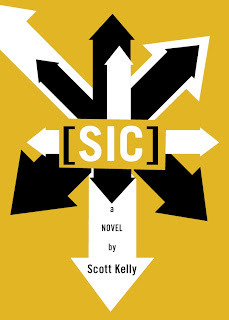 I love the cover; it's simple and complex at the same time.It's difficult to find a really well-written book that has a driving concept behind it. Some start with a great idea and others have beautiful prose, but to have both interwoven in one book is a rare, lovely thing. The Age of Miracles is one - the idea that the planet's revolution is gradually slowing sings out with lush phrases.
I love the cover; it's simple and complex at the same time.It's difficult to find a really well-written book that has a driving concept behind it. Some start with a great idea and others have beautiful prose, but to have both interwoven in one book is a rare, lovely thing. The Age of Miracles is one - the idea that the planet's revolution is gradually slowing sings out with lush phrases.[sic] is another. The book is about a group of kids who play a game called Eureka, invented by David, the ringleader (more about him later.) In the game, if someone gets tagged "It," they must do something in the next fifteen minutes to completely change his life. Or her life.
At first the game is simple - a damaged, gorgeous girl gets tagged and kisses a nerdy guy in front of everyone in the school, David switches paperwork between two McMansions. But as things progress, the game and the changes inflicted by the kids themselves become more and more trippy.
That's the concept, and it's a good one. A lesser writer would have created a decent manuscript that tells the story of the kids and the game as a compelling enough read. But this is Scott Kelly, who is a real wordsmith. Look at how he describes Kent's father, the landlord of the trailer park where the Eureka players all live:
 Scott Kelly, the author
Scott Kelly, the authorKent's dad slept under an awning. Rolls of fat spilled out from the sides of the larn chair. Dad once warned me to stay away from Mr. Gimble - fairly easy advice to follow, because the landlord seemed violent and pissed off at all times.A sweaty thatch of faded blondhair gave way to fat cheeks and thick jowls. What struck me most was how sad Kent's dad looked. Not mad at all. Just a defeated frown, like he was about to start bawling in his sleep. Like dreaming was torment. Like it hurt to be.I could guess the cause of his nightmares: the landlord hated being alone with himself.
The narrator is Jacob. He frames the story as he speaks to police, to a youth psychologist, and also to us. [sic] begins with David's death, and throughout the book, Jacob is trying to describe what happened. I dare you to read that first paragraph and not want to find out what happens:
My personal savior is named David Bloom, and presently he's falling about ten stories from the top of a water tower. And my stupid stunned mind; all I can think is that he looks great doing it. Arms spread, fingertips extended, face serene - homicide by stage dive. His body returns to the earth below, the ten-story drop reducing him to a streak of white and blue cloth, brown hair blown back from closed eyes. Maybe he's smiling. Maybe I just like to think so.
By the way - the story is told in the past tense, a big plus for me. I'm not a present tense fan at all. After that first paragraph, the tense switches smoothly to the past, and Kelly makes it work. And the added concept of David's fall (or flight) is extended throughout the book, as Jacob seeks the blame for David's death: "I blame the death of David Bloom on the fact that after the math, David always won. His solar system spun, and we were trapped in its orbit."
David himself is the catalyst, although his influence extends through the other kids. He is attractive:
David's skin shone against low-hanging sun, wisps of curled brown hair a halo charged by the dawn's light. Never got a haircut his mom didn't give, so it was shoulder-length, in calm curls. Angry almond eyes.
The other kids are vivid characters as well. There is Kent, the son of the landlord, who could have been a simple, static character but reveals layers of personality as the story unfolds. Cameron is the damaged beauty, molested by Kent's dad, who kisses Steven, the dweeby guy. There's Emily, the girl who is "all dyed black hair and army boots." She might be one of my favorite characters, even though she is dangerous - perhaps because she is dangerous - she refuses to put up with things as they are. Perhaps it is the reason that she embraces Eureka. The kids are the players : they are called the Six.
And then there is an outsider, Nora - an overweight girl that Jacob falls for. The description of her and the growing relationship between Jacob and the girl who refuses to play the game that takes over the lives of the Six.
That creates a great tension between her and Jacob, although the other relationships (between Cameron and Kent, Emily and Jacob, and Jacob and David himself) are also explored deeply.
It's as if Kelly stretches things, so we can see the thoughts and feelings behind the mumbled conversations and making out sessions between the members of the Six and Nora. He finds the "liminal spaces" (read the book to find out what that is) hiding in their interactions.
There were some sections that made me pause. For example, in the second half of the book, when David talks to the Six about his philosophy, he doesn't sound like a teen but a professor. I get that he is supremely intelligent (he paints impressions of music so you can almost hear it) but would a teen kid really say, "Change is the only constant, and so we must constantly change"?
I was also disappointed that Nora became a thin girl. Over the course of the book, she loses weight and shows off her mile-longlegs and her "athletic ponytail." I would have loved the originality if Jacob had continued to fall for her, pounds and all.
However, I must say that these flaws (along with one POV change and one over-compression of events) stood out BECAUSE the book is so good. If that lesser writer had offered the book, these would have been lost, as trash inside a messy trailer gets kicked to one side. In the glowing symphony of Kelly's book, I noticed them because of the beauty of everything else.
And let me mention here, before I forget, the soaring beauty of the grackle image - those birds that pick trash near the trailerpark. They occur throughout the book, and it is a lovely, sustained metaphor.
I would still highly recommend [sic] because of the concept, the writing, the characters - and the amazing ending. The book accomplished that rare thing - it entertained me and made me think, at the same time.
You can purchase [sic] on Amazon or add it to your Goodreads list.
As well, read more about Scott Kelly's book on Facebook or his author website.
Published on November 30, 2012 05:46
November 29, 2012
Print Proofs!
I just had to show off what arrived in the post today:

They look all shiny and new!
And then there are the maps:

And the drop caps:

And the journal entry pages:
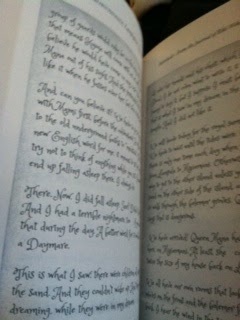
Hurray! Thanks again to my cover designer, Lisa Daly, for the wonderful print format she did. As usual, the proofs look perfect, thanks to her hard work.

They look all shiny and new!
And then there are the maps:

And the drop caps:

And the journal entry pages:

Hurray! Thanks again to my cover designer, Lisa Daly, for the wonderful print format she did. As usual, the proofs look perfect, thanks to her hard work.
Published on November 29, 2012 15:10



